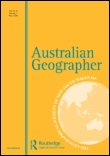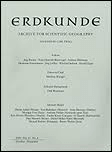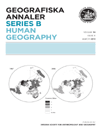
Revista Geoaraguaia
Scope & Guideline
Fostering Innovative Research for Societal Impact
Introduction
Aims and Scopes
- Environmental Studies:
Emphasizes research on environmental quality, land use, and ecological assessments, exploring the relationship between human activities and natural ecosystems. - Geographic Education:
Focuses on innovative teaching methodologies and the integration of technology in geography education, promoting critical thinking and spatial literacy among students. - Social Geography:
Investigates the socio-spatial dynamics of communities, including issues related to identity, culture, and social justice, particularly in the context of marginalized groups. - Urban and Regional Planning:
Explores urbanization processes, spatial planning, and the impact of human settlements on the environment, addressing sustainability and urban resilience. - Remote Sensing and Geoinformatics:
Utilizes advanced geospatial technologies and remote sensing methods for land cover mapping, environmental monitoring, and spatial analysis. - Interdisciplinary Research:
Encourages collaborative studies that bridge geography with other disciplines, such as sociology, anthropology, and environmental science, to address complex societal challenges.
Trending and Emerging
- Climate Change and Environmental Justice:
Increasing research on the impacts of climate change on vulnerable populations, emphasizing the intersection of environmental and social justice. - Geographical Information Systems (GIS) and Remote Sensing:
A growing emphasis on advanced GIS and remote sensing techniques for environmental monitoring and spatial analysis, showcasing technological advancements in geography. - Intersectionality in Geography:
Emerging studies focusing on intersectional perspectives in geography, particularly regarding gender, race, and class dynamics within spatial contexts. - Agroecology and Sustainable Development:
A significant rise in research related to agroecological practices and their role in achieving sustainable development goals, reflecting global sustainability trends. - Urban Resilience and Adaptation Strategies:
Increasing attention to urban resilience, highlighting adaptation strategies in urban planning to mitigate the impacts of environmental changes. - Digital Pedagogy in Geography Education:
A notable trend towards integrating digital tools and resources in geography education, enhancing engagement and learning outcomes among students.
Declining or Waning
- Traditional Geographic Methodologies:
There seems to be a waning interest in purely traditional geographic methods without the integration of technology or interdisciplinary approaches, as newer methodologies gain prominence. - Historical Geography:
Research focusing solely on historical geography appears to be declining, possibly overshadowed by contemporary studies addressing current socio-environmental issues. - Purely Theoretical Frameworks:
There is a noticeable reduction in papers that rely exclusively on theoretical discussions without empirical data, as the journal shifts towards more applied research. - Land Use Planning without Sustainability Focus:
Studies that discuss land use planning without a sustainability angle are becoming less common, reflecting a broader trend towards integrating environmental considerations in planning. - Single-Dimensional Environmental Assessments:
Research that does not incorporate social, economic, or cultural dimensions into environmental assessments is decreasing, emphasizing a more holistic approach.
Similar Journals

Hrvatski Geografski Glasnik-Croatian Geographical Bulletin
Exploring the Depths of Geography Since 1929Hrvatski Geografski Glasnik-Croatian Geographical Bulletin, ISSN 1331-5854, E-ISSN 1848-6401, is an esteemed open-access journal published by the Croatian Geographical Society that has been serving the geography community since 1929. Based in Zagreb, Croatia, this journal focuses on a broad spectrum of geographical research, providing a platform for the dissemination of original articles, reviews, and case studies that contribute to the understanding of earth-surface processes and development planning. Although it currently holds Q4 rankings in both Earth-Surface Processes and Geography, Planning and Development, the journal is dedicated to enhancing its impact within the scientific community, aspiring to elevate research visibility and collaborative opportunities. With a commitment to open access, it ensures that all content is readily available to researchers, professionals, and students worldwide, fostering an inclusive environment for geographical scholarship. Engaging with this journal presents an opportunity to stay updated with emerging trends and pivotal studies within the discipline throughout its converged years from 1998 to 2024, making it a vital resource in geography and related fields.

Cadernos de Geografia
Connecting Global Perspectives through Open Access GeographyCadernos de Geografia is a distinguished biannual journal published by UNIVERSIDADE DE COIMBRA, FACULDADE DE LETRAS, dedicated to the field of geography and related social sciences. With its ISSN 0871-1623 and E-ISSN 2183-4016, this journal has been a prominent platform for the dissemination of high-quality research since it became open access in 2012. Situated in Coimbra, Portugal, it aims to foster academic excellence by providing an inclusive space for innovative studies that explore contemporary geographical issues. Cadernos de Geografia encourages submissions that address diverse aspects of geography, ranging from environmental studies to urban planning, making it an invaluable resource for researchers, professionals, and students alike. As a part of the growing trend in open-access publishing, it enhances the global reach and accessibility of geographical research, thereby contributing to the enrichment of knowledge in the field.

Urban Science
Transforming Urban Challenges into OpportunitiesUrban Science, published by MDPI in Switzerland, is a pioneering open access journal that has been serving the academic community since 2017. With a robust focus on understanding urban environments through various interdisciplinary lenses such as Environmental Science, Geography, Planning and Development, and Urban Studies, this journal aims to advance knowledge on the complexities of urban living and the challenges that modern cities face. Recognized for its impact, Urban Science holds prestigious rankings, including Q1 in Urban Studies and Q2 in multiple relevant categories. Its presence in leading databases like Scopus, where it stands among the top percentile ranks, underscores its contribution to critical dialogues in urban research. The journal’s commitment to accessibility, targeted toward researchers, professionals, and students alike, fosters an inclusive platform for disseminating innovative ideas and solutions necessary for sustainable urban development.

Boletin de la Asociacion de Geografos Espanoles
Fostering collaboration and innovation in geographical research.Boletin de la Asociacion de Geografos Espanoles is a leading open-access journal dedicated to advancing knowledge in the fields of geography, urban studies, and environmental science. Published by the ASOCIACION ESPANOLES DE GEOGRAFIA, this esteemed journal has been a vital platform for geographers and researchers since 1984, facilitating the dissemination of high-quality research and insights. With an ISSN of 0212-9426 and E-ISSN of 2605-3322, the journal has been recognized for its contributions, currently ranking in Q3 in Earth-Surface Processes, Environmental Science, and Geography, Planning and Development, as well as Q2 in Urban Studies for 2023. The journal’s accessibility ensures a broad audience reach, supporting the engagement of researchers and professionals alike. Located in Madrid, Spain, and publishing from 2006 to 2024, the Boletin de la Asociacion de Geografos Espanoles stands as an essential resource for those invested in the geographical sciences and related disciplines.

Biblio 3W-Barcelona
Fostering scholarly communication in information science.Biblio 3W-Barcelona is a prominent academic journal published by the Universitat de Barcelona, Servei Publicacions, focusing on the dynamic field of library and information science. Established to foster scholarly communication, this journal provides a platform for researchers, professionals, and students dedicated to the advancement of bibliographic studies and library management. Despite lacking a current impact factor, Biblio 3W-Barcelona is recognized for its commitment to high-quality research and its contribution to the field, making it a valuable resource for those engaged in understanding the complexities of information dissemination in modern society. The journal features original research articles, critical reviews, and case studies that invite varied perspectives within the realm of librarianship. Readers can access its comprehensive body of work freely, enriching their knowledge and fostering practical applications in library science. For submission guidelines and further information, visit their website.

GEOGRAFICKY CASOPIS-Geographical Journal
Navigating the landscape of contemporary geographical research.GEOGRAFICKY CASOPIS-Geographical Journal is a prestigious publication dedicated to advancing knowledge in the fields of geography and earth sciences, published by the SLOVAK ACADEMY OF SCIENCES, INSTITUTE OF GEOGRAPHY. With a rich history dating back to its inception in 1976, the journal serves as a vital forum for researchers and professionals to disseminate their findings across a range of topics including earth-surface processes, geography, planning, development, and geology. Notably, it maintains a respectable Q3 category ranking across these disciplines as of 2023, indicating its contribution to relevant academic discourse. The journal is indexed under critical databases and engages a global audience, making it an essential resource for scholars seeking to stay informed about contemporary issues and advancements in geography. Although currently not an open-access journal, it emphasizes the sharing of significant research findings and encourages submissions from various geographical contexts to enrich the scientific community. Geographical Journal's commitment to fostering interdisciplinary dialogue ensures its relevance and importance in shaping the future of geographical research.

Journal of Geographical Sciences
Exploring the Frontiers of Earth and Planetary Sciences.Welcome to the Journal of Geographical Sciences, a premier publication in the field of Earth and Planetary Sciences that has consistently demonstrated its impact and relevance since its inception in 2001. Published by SCIENCE PRESS, this esteemed journal is recognized for its rigorous peer-review process and high-quality research, achieving an impressive Q1 ranking in the 2023 category of Earth and Planetary Sciences (miscellaneous). With the latest Scopus ranking placing it at Rank #13 of 159, putting it in the top 8% of its field, the journal serves as a vital platform for disseminating significant findings and innovative methodologies in geography, environmental studies, and related disciplines. Although not an open-access journal, it offers exceptional visibility through its publication standards and accessibility in academic databases. Based in Beijing, China, the Journal of Geographical Sciences continues to pave the way for scholarly discourse and collaborative research, appealing to researchers, practitioners, and students dedicated to advancing our understanding of geographical phenomena.

AUSTRALIAN GEOGRAPHER
Exploring the Depths of Geographic ScholarshipAUSTRALIAN GEOGRAPHER, published by Routledge Journals, Taylor & Francis Ltd, is a leading scholarly journal that captures the dynamic and multifaceted field of geography. With an ISSN of 0004-9182 and an E-ISSN of 1465-3311, this peer-reviewed journal has a long-standing tradition, dating back to its origins between 1928 and 1929, and is essential for those engaged in cutting-edge research in Earth-Surface Processes and Geography, Planning and Development. Recognized for its academic rigor, the journal holds a prestigious Q1 ranking in both Earth-Surface Processes and Geography categories as of 2023. Furthermore, its Scopus rankings underscore its influence, placing it in the top 30% of its field. Although it does not currently offer Open Access, AUSTRALIAN GEOGRAPHER remains a critical platform for presenting significant geographic research and fostering academic dialogue, making it indispensable for researchers, professionals, and students eager to contribute to the evolving landscape of geographic scholarship.

Erdkunde
Charting New Territories in Geographic DiscourseErdkunde is a pivotal academic journal published by the Geographisches Institut, University of Bonn, dedicated to the fields of Geography, Earth and Planetary Sciences, and Ecology. With a history dating back to 1976, this journal serves as a platform for interdisciplinary research and discourse, reflecting diverse perspectives from both theoretical and applied dimensions within these domains. Published in Germany, it currently holds a respectable position within the academic community, classified in Q2 for Geography, Planning and Development and Q3 in Ecology and Earth and Planetary Sciences. Although not an open-access journal, its contribution is significant, offering insights that advance our understanding of spatial dynamics and environmental processes. With Scopus rankings that place it within the median range, Erdkunde is an essential resource for researchers, professionals, and students looking to deepen their knowledge and engage with contemporary trends in geographic research.

GEOGRAFISKA ANNALER SERIES B-HUMAN GEOGRAPHY
Innovating research that shapes our understanding of space and society.GEOGRAFISKA ANNALER SERIES B-HUMAN GEOGRAPHY, published by Taylor & Francis Ltd, is a leading academic journal dedicated to advancing the field of human geography. With an ISSN of 0435-3684 and an E-ISSN of 1468-0467, this journal has established its reputation since its inception in 1976. It currently holds a prestigious Q1 ranking in Geography, Planning, and Development, reflecting its significant impact in the academic community with a Scopus rank of #243 out of 821 in its category, showcasing a 70th percentile standing among its peers. The journal aims to publish high-quality, innovative research that enhances our understanding of the complex interactions between humans and their environments. Although it operates on a subscription basis, the rigor of its peer-review process and the quality of published articles make it an essential resource for researchers, professionals, and students alike. By exploring pivotal themes in human geography, the journal not only contributes to academic discourse but also informs policy-making and practical applications in the field.